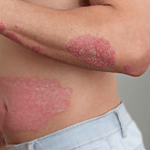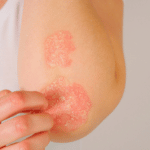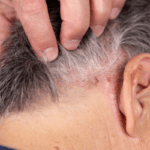If you or your loved one has psoriasis, you are familiar with the daily challenges of this skin condition. The red, itchy, scaly patches are difficult to manage.
Note that psoriasis is not a contagious skin condition. A person with psoriasis cannot transmit it to others, by any means of physical touch. However, if you already have psoriasis, it can spread to other body parts. Psoriasis patches can increase and develop on the parts that were clean three days ago.
So how do you stop the psoriasis patches from spreading to the rest of your body? Learn everything you need to know about psoriasis spread in this article.
What is Psoriasis?
Let’s begin from the basics.
Psoriasis is a common chronic inflammatory skin condition. It is propelled by the immune system and hence, grouped under autoimmune diseases.
Read: How to Cure Psoriasis Permanently
It is a skin disease where your skin cells are your demons. When they grow at a faster rate than they can be shed, excess skin begins to build up. It causes red scaly patches on your body, which get itchy due to dryness.
So, how do you stop psoriasis from spreading? Here are the 5 ways…
1. Use Moisturizing Lotions

Sounds so basic, right? Well, moisturizing your skin is all it may require for you to stop psoriasis from flaring up.
Dry skin is one of the most common triggers of psoriasis. When you use moisturizers and keep your skin moisturized, it traps moisturize beneath your skin, speeding the healing process.
Use thick and oily creams and lotions, such as petroleum jelly. You can also try tar shampoo and soap or products with salicylic acid to reduce the appearance of flaky plaques. However, some products may react adversely to your skin, so talk to a dermatologist first.
Moreover, avoid taking overly hot showers, as they make skin dry. After stepping out of the shower, pat your skin dry and immediately seal it with an unscented moisturizer. You can cover the scales with plastic wrap for a few hours after applying cream to remove the scales.
2. Avoid Dry and Cold Weather

Climatic conditions can have a significant impact on your psoriasis. As stated above, dryness can cause a flare-up in the red and itchy skin scales.
During fall and winter, there is an increase in dry air and a decrease in the levels of exposure to sunlight’s ultraviolet rays. Experts believe that ultraviolet light hinders the rapid growth of skin cells. Hence, the psoriasis symptoms worsen.
The cold makes your skin dry and sucks out the moisture. To keep the skin moist, you have to ensure your room temperature is moist. Install a humidifier and turn it on when the air inside your house is too dry.
Read: 10 Vitamins and Supplements That are Good for Dry Skin
3. Watch What You Eat

Your diet can make a massive difference to your psoriasis symptoms. There are a few food items that you should strictly avoid as they can be triggers to your skin condition. Let’s have a look at them –
- Red meat has polyunsaturated fatty acids that can trigger inflammation.
- Sugar — you shouldn’t be surprised! Sweet junks, such as candy, pastries, chocolate, and other desserts, have carbohydrates with a high glycemic index, which is a trigger.
- Gluten makes Celiac disease worse, which is also an autoimmune skin condition like psoriasis. Wheat, rye, barley, malt, and other gluten foods can be a risk to you.
- High-fat dairy can cause digestion issues, leading to chronic gastrointestinal irritation. It can make psoriasis worse.
- Fried foods are high in saturated fats, which have inflammatory compounds called AGEs.
Increase the number of fruits and leafy vegetables in your diet — they are high in antioxidants, which protect your cells against inflammation. Omega-3 also helps with the same, so you can include fatty fish and olive oil in your meals. For a comprehensive ideal diet, talk to a nutritionist.
Read: Psoriasis Treatment Diet: Foods to Eat and Avoid
4. Protect Your Skin

Have you heard of Koebner’s phenomenon? It is the appearance of new skin lesions on previously unaffected skin due to trauma. When people with psoriasis get a sunburn, cuts, infection, and even vaccinations, the skin shows trauma response, resulting in flare-ups. Hence, you need to be extra careful and avoid all kinds of bumps, cuts, and infections.
You can use the following tips…
- If you’ll be in the sun for extended periods, do not forget to apply sunscreen. While some ultraviolet light may help heal your psoriasis, as we stated above, too much exposure can damage your skin. It may even lead to skin cancer. Use sunscreen on all the affected areas and the non-affected areas. Also, keep reapplying every few hours.
- You should take extra care to avoid friction, cuts, or scrapes. If you get injured, try to avoid the infection by using healing ointments. If you experience any signs of infection (redness, warmth, swelling, fever), reach out to your doctor.
- Vaccination doses could lead to a psoriasis flare-up. If you are getting vaccinated, talk to your skin doctor in advance. Keep a close eye on your skin following vaccinations.
5. Stop Smoking and Drinking

Alcohol dilates the blood vessels and gives WBCs and other substances in the blood easier access to the skin. It promotes the inflammatory response of your skin and triggers psoriasis flares. Moreover, it dehydrates your skin and causes dryness, worsening psoriasis symptoms. Also, your psoriasis medication may not react well with alcohol.
If you have trivial symptoms of psoriasis, limit your alcohol intake to 1-2 drinks a day. However, if you have severe symptoms, you should cut your alcohol consumption entirely.
Severe smoking habits can also flare up your symptoms. Researchers suggest that it might be due to the oxidative stress, interaction with signaling pathways active in psoriasis, and vascular influences. If you cannot quit on your own, enroll in smoking cessation programs.
Psoriasis is treatable over time. Follow your doctor’s advice and the above-listed ways to control the flare-up. If you adopt a consistently healthy lifestyle, you may get rid of the nasty skin condition completely.




